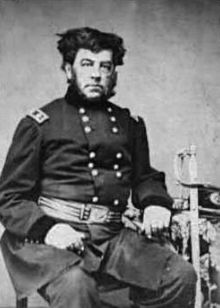George Cadwalader
| George Cadwalader | |
|---|---|

George Cadwalader
|
|
| Born |
May 16, 1806 Philadelphia, Pennsylvania |
| Died | February 3, 1879 (aged 72) Philadelphia, Pennsylvania |
| Place of burial | Christ Church Burial Ground, Philadelphia, Pennsylvania |
| Allegiance |
United States of America Union |
| Service/branch |
United States Army Union Army |
| Years of service | 1847–1848, 1861–1865 |
| Rank |
|
| Commands held | 2nd Brigade, 3rd Division Military Commander of Maryland 1st Div, Army of the Shenandoah |
| Battles/wars | American Civil War |
George Cadwalader (May 16, 1806 – February 3, 1879) was a general in the United States Army during the Mexican-American War and American Civil War.
Cadwalader was born and raised in Philadelphia. He studied law and was admitted to the bar. He served in the Pennsylvania state militia and suppressed anti-foreign riots in Philadelphia.
His father was Thomas Cadwalader (1779–1841), not to be confused with his cousin Thomas McCall Cadwalader, (1795–1873) who was a general from New Jersey. His mother was Mary Biddle (1781–1850), who was the daughter of Clement Biddle, (1740–1818) who served in the American Revolutionary War.
He married Frances Butler Mease in 1830. They had one daughter, Frances, who died young.
In 1824, Cadwalader formed a Pennsylvania State Militia artillery company known as the Philadelphia Grays and served as company captain. In 1832, he was elected brigadier general of the First Brigade, First Division of the Pennsylvania State Militia.
While holding this position, he was criticized for his weak role in the Philadelphia anti-Catholic riots of 1844. Cadwalader refused to allow the militia to take action as rioters destroyed the Irish-Catholic neighborhood on Kensington in May 1844. When he did call out the militia five days after the violence began, his troops primarily stood as observers and did not actively try to suppress the riots. Cadwalader argued that he could not do so without express order from the governor. As a result, state law was changed several years later to permit emergency action without express approval from the governor.
In July of that same year, during three days of rioting in Southwark, a largely Catholic neighborhood in South Philadelphia, Cadwalader ordered his troops to fire into the crowd of nativists trying to destroy St. Philip Neri Church. The street battle resulted in the deaths of twelve rioters and two militiamen, with many more injured. These actions resulted in concern over the use of the military against civilian populations and led directly to the creation of a much stronger and more professional police force in Philadelphia.
...
Wikipedia
